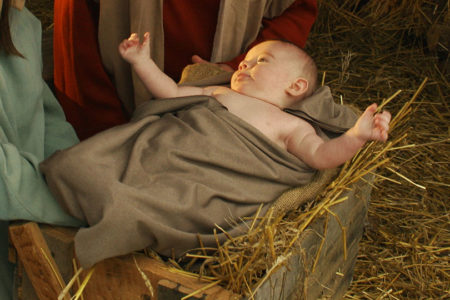The Messiah’s Life
The Jewish writings have much to say about the Messiah. Very little, however, is written about His identifying characteristics, aside from His being from the family of David and bringing peace. Gershom Scholem agreed with this when he wrote, “Yet the figure of the Messiah, in whom the fulfillment of redemption is concentrated, remains peculiarly vague” (The Messianic Idea in Judaism, p. 17).
Perhaps the reason for this revolves around the Christian belief in Jesus as the Messiah of Israel. It is possible that there is so much cultural animosity and bias—often with good reason, based on Christianity’s treatment of Jewish people through the centuries—that Jewish people will not consider the possibility of Jesus’ being the Messiah, even when they have virtually no arguments against this belief. Some Jewish people who have studied portions of the Messianic prophecies and the life of Jesus have so much cultural resistance that they explain away what seems so obvious to Christians.
This bias is often seen in interpreting Messianic passages. The very clear teaching of Isaiah 53, for example, is often explained away because of this proclivity. Scholem commented on this bias of interpretation of Isaiah 53: “In the Tannaitic period the ‘suffering servant’ passages had occasionally been interpreted as referring to the Messiah, but later Haggadicts as well as the medieval commentators preferred different interpretations. In order to undermine Christian exegesis, the suffering servant was interpreted as a figure of Moses, or of Israel, or of the pious in general. In Jewish-Christian disputations the Jewish spokesman always denied that the passages referred to the Messiah” (Sabbatai Sevi, pp. 53–54).
It is precisely from such passages as these that we should be able to identify the Messiah. Rabbi Moshe Kohen ibn Crispin, of Cordoba and later Toledo, Spain (14th century), understood Isaiah 53 to have this purpose: “This prophecy was delivered by Isaiah at the divine command for the purpose of making known to us something about the nature of the future Messiah, who is to come and deliver Israel…in order that if any should arise claiming to be himself the Messiah, we may reflect and look to see whether we can observe in him any resemblance to the traits described here: if there is a resemblance, then we may believe that he is the Messiah our Righteous; but if not, we cannot do so” (Driver and Nebauer, The Suffering Servant of Isaiah According to Jewish Tradition, pp. 114, 199ff).
The many false Messiahs through history could not have deceived so many in Israel if the advice of Rabbi Crispin had been heeded. Impostors such as Bar Kochba, David Alroy, and Shabbetai Zvi would have been quickly exposed if his guidelines had been taken into account.
The life of the Messiah is incomparable to any that has ever been lived. It is impeccable in its attitudes, unparalleled in its impact, and unrivaled in its uniqueness. Isaiah 53 covers the span of the Messiah’s life—from His birth, through His resurrection, to His triumphant return. Three claims are made about the life of the Messiah in this passage—claims that, when fulfilled, uniquely qualify the individual as the Messiah. These three prophecies deal with His reception, His perfect life, and His attitude when confronted by His accusers.
The Reception of the Messiah
The commonly held opinion among Jewish people believing in a personal Messiah is that when He comes, He will be welcomed by all. It is unthinkable that He would be rejected, since His major accomplishment will be the establishment of peace and happiness throughout the world.
The prophets speak of a Messianic age inaugurated by the Messiah—a time of unequaled peace and prosperity. But they also speak of the rejection of the Messiah.
This is shown in Isaiah 53: “He is despised and rejected of men, a man of sorrows, and acquainted with grief, and we hid as it were our faces from him; he was despised, and we esteemed him not” (v. 3). Despised, rejected, our faces hidden from Him, esteemed not—hardly the picture of a welcomed king.
When Jesus came the first time, He received just this type of “welcome.” The narratives of His life record the responses of the people. “Is not this the carpenter, the son of Mary…? And they were offended at him” (Mk. 6:3). “And the scribes and chief priests heard it, and sought how they might destroy him” (Mk. 11:18). “And many other things blasphemously spoke they against him” (Lk. 22:65). “He hath spoken blasphemy!…He is guilty of death…they spat in his face, and buffeted him” (Mt. 26:65–67). Anyone familiar with the Gospel accounts is aware that Jesus was despised, rejected, and not esteemed. These verses are but a few that tell the story.
However, to be critical of the Jewish people for this response is to be ignorant and hypocritical. Universally, Jesus has been rejected by all people, not just Jewish people. Although many Jewish people accepted Jesus as Messiah, the nation as a whole rejected Him. This was according to God’s plan and foretold by the prophets.
Later Jewish writings reflected this understanding of the rejection of the Messiah. A belief developed that there would be two Messiahs, each with His own work. The first would be Messiah ben Joseph, who would suffer and die. The second would be Messiah ben David, who would establish the kingdom and bring in the age of peace. Again, perhaps bias has produced this understanding. The message of the Bible is that there would be only one Messiah, but with two works. His first coming was prophesied to end with His rejection by the nation of Israel.
The Perfection of the Messiah
The Messiah’s perfection sets Him apart from the rest of humanity. Meanwhile, the curse of humankind is our sin nature, which not only separates us from God but has wrought untold havoc on individuals, families, and nations.
Again, the 53rd chapter of Isaiah specifies: “he had done no violence, neither was any deceit in his mouth” (v. 9). This brief statement speaks of both His external and internal perfection. Not only everything He did, but everything He said was without sin. It was necessary that the Messiah be perfect so that He could redeem us from our sin.
The Mosaic law is dear to the Jewish people, especially the more orthodox in practice. It is the heart and soul of religious Judaism. The law, however, is more than just a guide for living; it is a standard of righteousness that everyone must attain in order to dwell with God forever in heaven.
The problem is that no individual can possibly keep the law. Perfect fulfillment is required. This escapes the ability of everyone. As the Scripture teaches, “all have sinned, and come short of the glory of God” (Rom. 3:23). The law is an instrument of God to show individuals that they have sinned and cannot keep God’s perfect standards.
Two results can flow from the law—blessing and cursing. Passages such as Deuteronomy 28 delineate this for the nation of Israel. For individuals, however, it is a concern of eternal destiny. If people keep the law of God perfectly during their entire lives (Gal. 3:21), they can go directly into the presence of God. If, however, they break the law even once in their lives (Jas. 2:10; Gal 3:10), they are separated from God by their sin. It is abundantly clear that no one is sinless; thus, we all stand condemned before a Holy God. What, then, can we do?
After Adam sinned, all mankind inherited his sin nature. But God, in eternity past, had determined to send a Redeemer—the Messiah—for us. He would have to be a perfect sacrifice. He would have to live in such a way that He would never break God’s perfect standard of righteousness—the Mosaic law. That is why Jesus said, “Think not that I am come to destroy the law, or the prophets; I am not come to destroy, but to fulfill” (Mt. 5:17).
Jesus’ unique birth produced the only person in the world who did not have a sin nature. Because of this, He did not, nor could He, sin. Pontius Pilate, before Jesus’ accusers, said, “Behold, I bring him forth to you, that ye may know that I find no fault in him” (Jn. 19:4). Peter recorded, “Who [Jesus] did no sin, neither was guile found in his mouth” (1 Pet. 2:22). And Paul stated, “For he hath made him, who knew no sin, to be sin for us, that we might be made the righteousness of God in him” (2 Cor. 5:21).
As a man, Jesus had every right to enter the presence of God in heaven without a sacrifice because He never sinned. He kept the law perfectly from the time He was born until His death on the cross, resulting in the blessings of God’s promise—an entrance into heaven.
His love for mankind required Him not only to fulfill the blessing part of the law, but also the cursing. He took the judgment of God upon Himself by being made a curse for us. He didn’t deserve God’s punishment. He was perfect. But He willingly took God’s wrath upon Himself in our place, so that we, through faith, might have His righteousness credited to our account. This is the teaching of Galatians 3:13: “Christ hath redeemed us from the curse of the law, being made a curse for us; for it is written, Cursed is everyone that hangeth on a tree.”
The Messiah’s life was perfect in every aspect—not as an example, but to fulfill the law, that He might be our perfect substitute.
The Attitude of the Messiah
The natural inclination of mankind is to fight back when we have been unjustly accused or maligned. It is only when a higher spiritual purpose is in sight that people will not defend themselves against false claims and lies.
“And the chief priests accused him [Jesus] of many things; but he answered nothing” (Mk. 15:3). Pontius Pilate was amazed that Jesus would not defend Himself. “And when he was accused by the chief priests and elders, he answered nothing. Then said Pilate unto him, Hearest thou not how many things they witness against thee? And he answered him never a word, insomuch that the governor marveled greatly” (Mt. 27:12–14).
Jesus’ attitude toward His accusers was just as the Prophet Isaiah had predicted. His life matched the prophecy exactly. “He was oppressed, and he was afflicted, yet he opened not his mouth; he is brought as a lamb to the slaughter, and as a sheep before her shearers is dumb, so he openeth not his mouth” (Isa. 53:7). Jesus’ life was perfect. He was sinless and followed God flawlessly throughout His life. Despite of, or perhaps because of this righteous life, He was unjustly accused and brought before a biased court to be judged and sentenced. Jesus never complained about these injustices, in the same way that a sheep does not complain or object when its wool is being sheared.
The prophecy of Isaiah 53 is fulfilled in only one individual. His birth, life, death, and reign are all foretold in this most amazing of prophecies, which was written so that we might identify the Messiah. His life is unparalleled in the history of the world. As He said, He came not “to destroy the law, or the prophets…but to fulfill” (Mt. 5:17).







Not to burst your bubble but Ibin Crispin was not a rabbi.